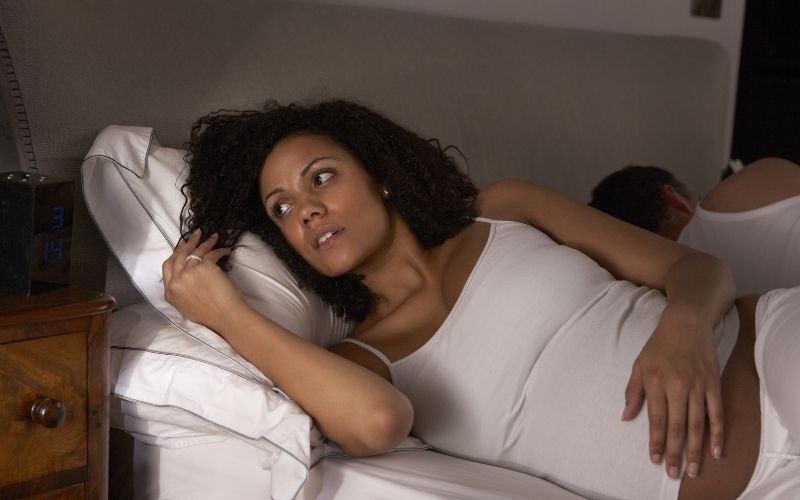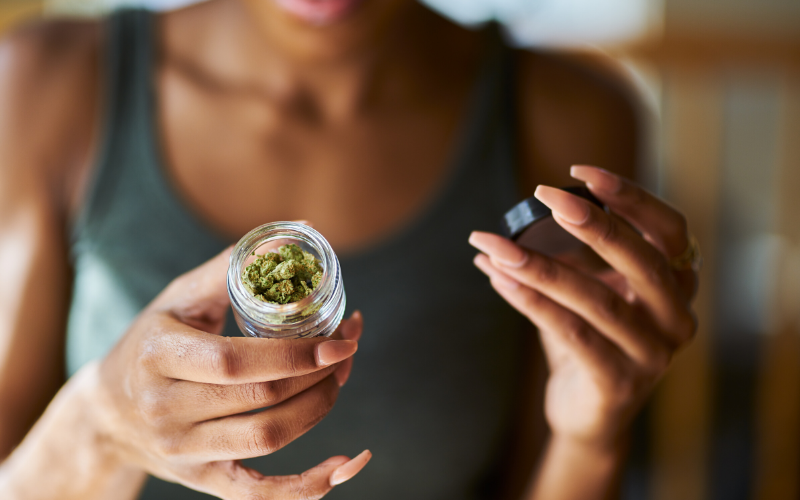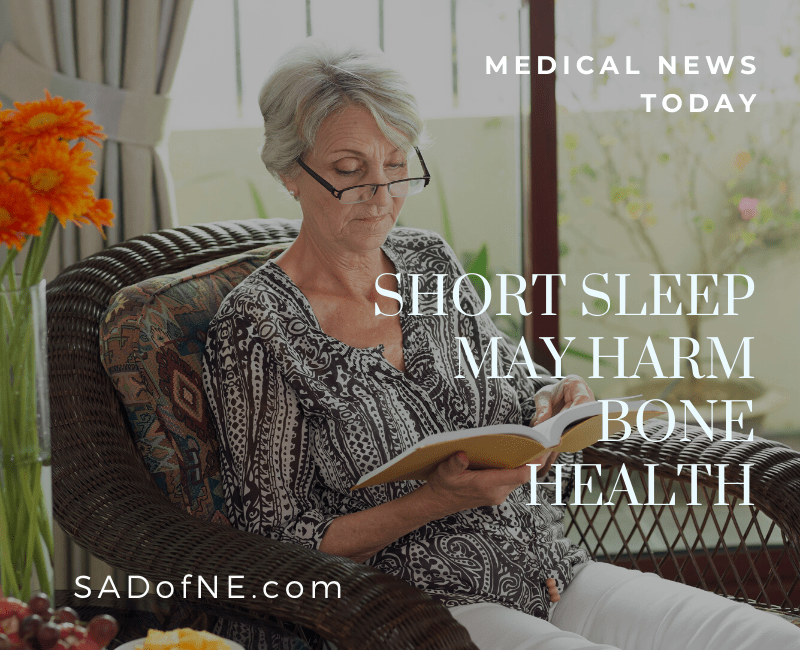For some women, a connection may exist between poor sleep and hormones
Original Post | Washington Post Health
By Leigh WeingusSeptember 18, 2021 at 9:00 a.m. EDT
I’ve struggled with sleep since I was a teenager, and have spent almost as long trying to fix it. I’ve absorbed countless books and articles on getting better sleep that instructed me to go blue-light free at least two hours before bedtime, take nightly baths to lower my body temperature, keep my phone far from my bedroom and avoid caffeine after 12 p.m.
In between all my diligent sleep hygiene work, I couldn’t help but feel like there was a larger force at play. My sleep seemed to change throughout my menstrual cycle, for example, getting worse in the days before my period and significantly better afterward. When I was pregnant, I experienced the best sleep of my life, and when I stopped breastfeeding, I didn’t sleep for days.

I finally started to ask myself: When we talk about getting better sleep, why aren’t we talking more about hormones?
According to the National Sleep Foundation, the lifetime risk of insomnia is 40 percent higher for women than it is for men. Blaming this discrepancy entirely on hormones oversimplifies it — women also tend to take on the bulk of household worrying and emotional labor, and they tend to experience higher levels of anxiety.
But according to Mary Jane Minkin, an obstetrician-gynecologist and clinical professor in the Department of Obstetrics, Gynecology, and Reproductive Sciences at the Yale School of Medicine, anecdotal evidence and studies suggest that hormones likely play a role.
If you look at the curve of hormonal secretion throughout the average menstrual cycle, Minkin says, you’ll see varying levels of estrogen and progesterone throughout the month, with a big drop of estrogen occurring right before menstruation.https://414a56c8c82860bb2b57ff47754d945d.safeframe.googlesyndication.com/safeframe/1-0-38/html/container.html
“Many people will tell me that a day or two before their period, their sleep is terrible,” Minkin says.
When a woman enters perimenopause, she starts to experience more fluctuations and produces less estrogen and progesterone throughout the month, which may wreak havoc on her sleep. The true correlation between these hormone dips and fluctuations and insomnia needs to be studied more extensively, Minkin and other experts say, and understanding this connection is confused by how a lack of estrogen is associated with hot flashes, which can disrupt sleep.
Studies of women on hormone replacement therapy (HRT) and sleep strongly suggest a connection between female hormones and insomnia, Minkin and other experts say.
HRT is often prescribed to women going through menopause (and the years after it) to help them deal with unpleasant side effects of that transition, which include sleep problems, Minkin says. Some types of HRT include only estrogen, while others have a combination of estrogen and progesterone. High levels of estrogen and progesterone occur naturally during pregnancy, which may explain why some pregnant women like me often experience blissful sleep, Minkin says.
“During pregnancy, guess what? Your levels of estrogen and progesterone are very high,” Minkin says.
Although postmenopausal women have very low levels of estrogen and progesterone, once the process of menopause is complete, they often begin to sleep better. “We think hormone fluctuations can be more bothersome to some women than their actual hormone levels,” Minkin says.
She adds that if a postmenopausal woman does struggle with insomnia, low hormone levels could be the culprit, so it’s a good idea to talk with a medical professional about HRT options. A 2008 randomized, controlled study of some 2,000 postmenopausal women in the United Kingdom found “small but significant” improvements in sleep after a year of HRT vs. those taking a placebo.
Hadine Joffe, a psychiatry professor who is executive director of the Mary Horrigan Connors Center for Women’s Health and Gender Biology at Brigham and Women’s Hospital at Harvard, says hormonal fluctuations may be a cause of insomnia for some women. But for others, she says, sleep disruptions might be anxiety-related, or caused by noisy neighbors or a snoring bed partner.
She says that while some women experience amazing sleep during pregnancy, many others report terrible insomnia during that time of life. Her advice? If you want to figure out whether any connection exists for you, track it.
“Try a [sleep] app or even a conventional sleep diary,” Joffe says. “If you track your sleep for several months, you may start to notice a pattern emerge, like more waking in the middle of the night right before your period.”
If you do notice a pattern, she says, that information may be helpful going forward.
“If you know there are two or three days in every month when you don’t sleep well, make sure that’s a time when you practice the best possible sleep hygiene, avoid alcohol, and if you have a partner you share family responsibilities with, you can ask them to get up with the baby or toddler,” Joffe says.
Sometimes targeted treatment for those days can help, too, she adds. For example, supplementing with a few milligrams of melatonin before bedtime — the hormone our brains naturally produce in response to darkness — can help signal to the brain that it’s time to sleep. Or if you have a prescription for a sleep aid, this could be the time to use it, she says.
While it’s not always possible due to work or family responsibilities, Kin Yuen, a sleep medicine specialist at Stanford Medicine, suggests trying your best to honor your natural daily hormone fluctuations to help keep your sleep on track. To do this, you’ll have to try to figure out when your body naturally releases cortisol (the hormone we produce in the morning that helps us wake up) and melatonin (the hormone we produce at night to help us fall asleep).
By figuring out when you have the most energy — are you an “early bird” who wakes up full of energy, or a “night owl” who still feels sluggish at 9 a.m.? — you can better pinpoint when your body naturally releases these hormones. If you adjust your schedule to honor these rhythms, you may experience fewer sleep disruptions even in the face of constantly fluctuating female hormones, Yuen says.
Finally, while HRT is not prescribed for women who have not yet gone through menopause, both Minkin and Joffe say that if someone is sure that their insomnia is hormone-related — preferably by having kept a diary for a while and after having tried other techniques without success — it’s worth talking to their doctor about taking a birth control pill.
“Hormonal birth control can smooth out the ups and downs that just aren’t good for some people’s brains,” Joffe says. “It has to be the right treatment for the right person, but it can help.”
Of course, there are side effects to birth control. Some women report nausea, headaches and lower libido. Although rare, more serious side effects have been reported, too, such as blood clots.
But for many women suffering from what seems to be hormonally related insomnia, the benefits may outweigh the risks.
Minkin says that even for patients going through menopause, if they are otherwise healthy, she’ll often prescribe birth control pills. Birth control pills have higher levels of hormones than traditional HRT, and if a woman has used them in the past and hasn’t experienced negative side effects, this can be a good indication that they will work well for her.
“The only drawback is that we have no way of knowing when a woman is done with menopause, because the pill will artificially give her a period,” Minkin says. “So in order to find out if she’s done with menopause, she has to stop the pill.”
At this point, Minkin and other experts say more research needs to be done to truly understand how the ebbs and flows of female hormones impact sleep.
Sleep diaries, trackers and apps can be powerful tools to help a woman understand whether a connection exists for her, and they can help her act accordingly, the experts say.
The pandemic is ruining our sleep. Experts say ‘coronasomnia’ could imperil public health.
It’s not just the pandemic. The moon may be messing with your sleep, too.




